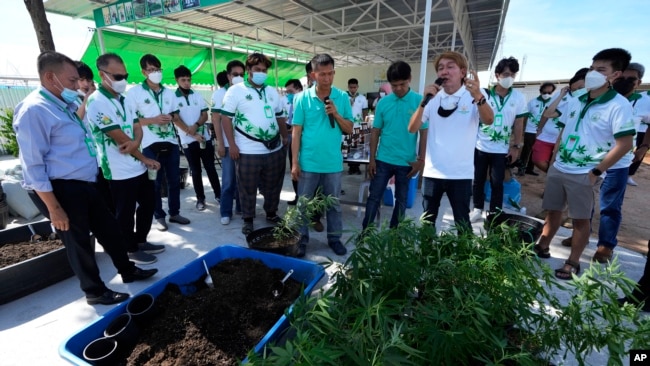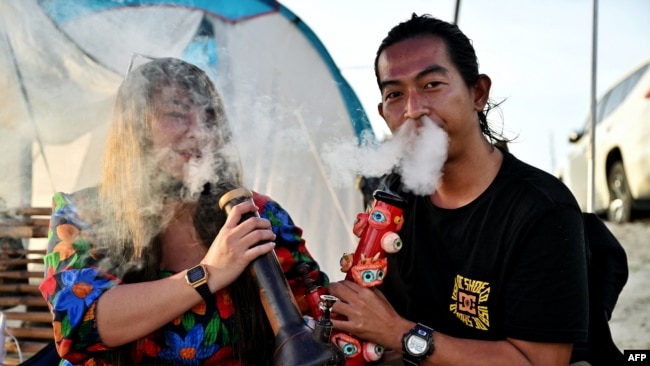For three years, Lek secretly cultivated her cannabis plants in rural
northeastern Thailand, still afraid of arrest by authorities wielding
tough drug penalties despite the promises of a gradual loosening of the
law.
On June 9, cannabis was effectively decriminalized and she finally
emerged from the underground weed scene to become a legitimate grower,
part of an army of newcomers to the most-hyped market in Thailand.
“We’re in a ‘vacuum period’ so anyone can practically do anything for
now,” said Lek 34, whose full name is Piyatida Jantra, as she prunes her
100 or so plants in Korat.
The area is the gateway to Isaan, a region of rice and sugar farmers
facing plummeting prices for their staples and in desperate need of a
new cash crop.
Thailand is the first Southeast Asian country to take such liberalizing
steps, recognizing the medicinal — and economic — benefits the plant may
bring.
The country’s journey toward becoming a paradise for cannabis consumers
and entrepreneurs is unexpected in a kingdom where successive
governments have taken a zero-tolerance attitude toward drugs.
The change began with a 2019 election pledge by Anutin Charnvirakul, a
connected billionaire with big political ambitions, who promised to
unlock the law to help farmers in the Isaan area with a new cash crop
primarily for the medicinal market.
Isaan is the most highly populated part of Thailand and will be
crucial in securing votes in the next general election, scheduled in the
first quarter next year.
Turning on the tap to billions of dollars of new potential revenue also
was warmly welcomed by the monopolies that dominate the Thai economy —
and backed by the army-linked government, in which Anutin serves as
health minister.
Major corporations and rich private investors got ahead of the law,
buying up vast plantations to grow cannabis in the best soils across the
north and northeast, and establishing factories to extract premium CBD
oil.
That left them in a position to seize market share when last month’s
decriminalization made it legal to grow, trade and use all cannabis
products, from the leaves and stems to the bud.
Legally restricted for medicine or food
Currently, cannabis is in theory restricted to use in medicine or in
food and must contain less than 0.2 percent tetrahydrocannabinol (THC),
the compound that creates the “high.”
In practice, it is a legal gray area that has ruled out prosecutions
under drug laws; there is currently not even a minimum legal age to buy
or sell it.
A cannabis bill is due in the coming months to detail exactly what can and can’t be done.
For smallholders like Lek, there are fears it will be written with the
interests of large corporations in mind, rather than homespun businesses
like hers.
“The government needs to go all the way … where every household can grow their own, no more controls,” she told VOA News.
“But once the law is passed, I guarantee you there’s only going to be one big group of capitalists who will gain.”
'Amsterdam of Asia'
At present, cannabis chaos pervades the kingdom: Tourists are openly
smoking joints on the famous Khao San Road in Bangkok, while some Thais
have appeared on TikTok videos seemingly unable to move after eating
marijuana brownies. The government has urged cannabis growers and users
to be responsible and discreet.
“The main goal of weed legalization is still for medicinal benefits, to
boost the economy and wellness,” the prime minister’s spokesperson told
reporters on June 29.
“We ask that everyone cooperates during this vacuum period until the official law is passed.”
Weed aficionados are celebrating a law change allowing a long-hidden
culture into the light. It’s also stirring a major market opportunity
and research into the benefits of a plant found native in Thailand for
centuries.
“Everyone will have their own space within this industry,” said
Chokwan “Kitty” Chopaka, an advocate and entrepreneur who has been
bombarded by inquiries since opening her dispensary in downtown Bangkok a
couple of days after it became legal.
“It’s not just growers, sellers and consumers … we still also need researchers, accountants, marketeers, product photographers.”
Other industry insiders say there is no rolling back the law.
One of those is Siriya Thepcharoen, based at Siam Cannabis Land in
Chonburi, eastern Thailand, which includes a museum, vast underground
laboratories growing weed strains like “White Widow” and a plantation.
She said the mission of her company, NUSA CSR, is to help make Thailand
the global hub for medicinal marijuana use.
“We are targeting medical tourists with certain conditions like
insomnia, stress, Alzheimer’s, and for the elderly who also want to come
to Thailand for R&R,” she told VOA.
“But we will also target young people who may travel here for recreation, seeing Thailand as the ‘Amsterdam of Asia.’”








